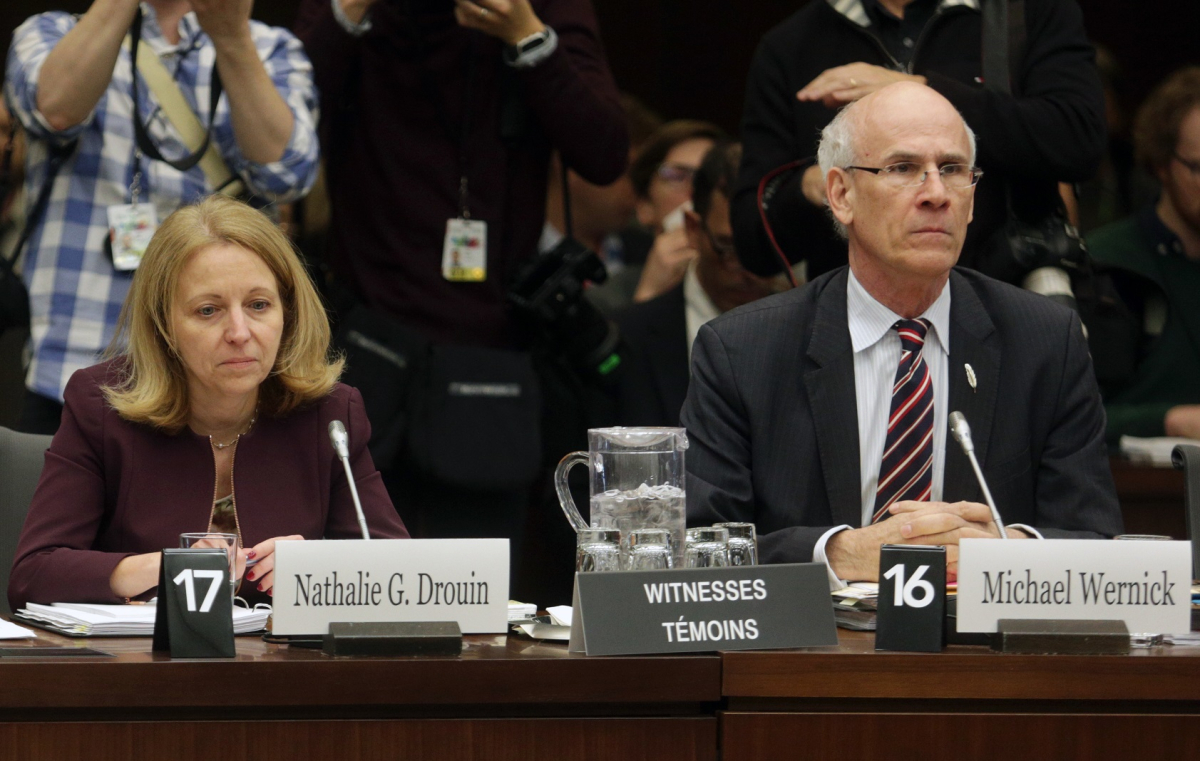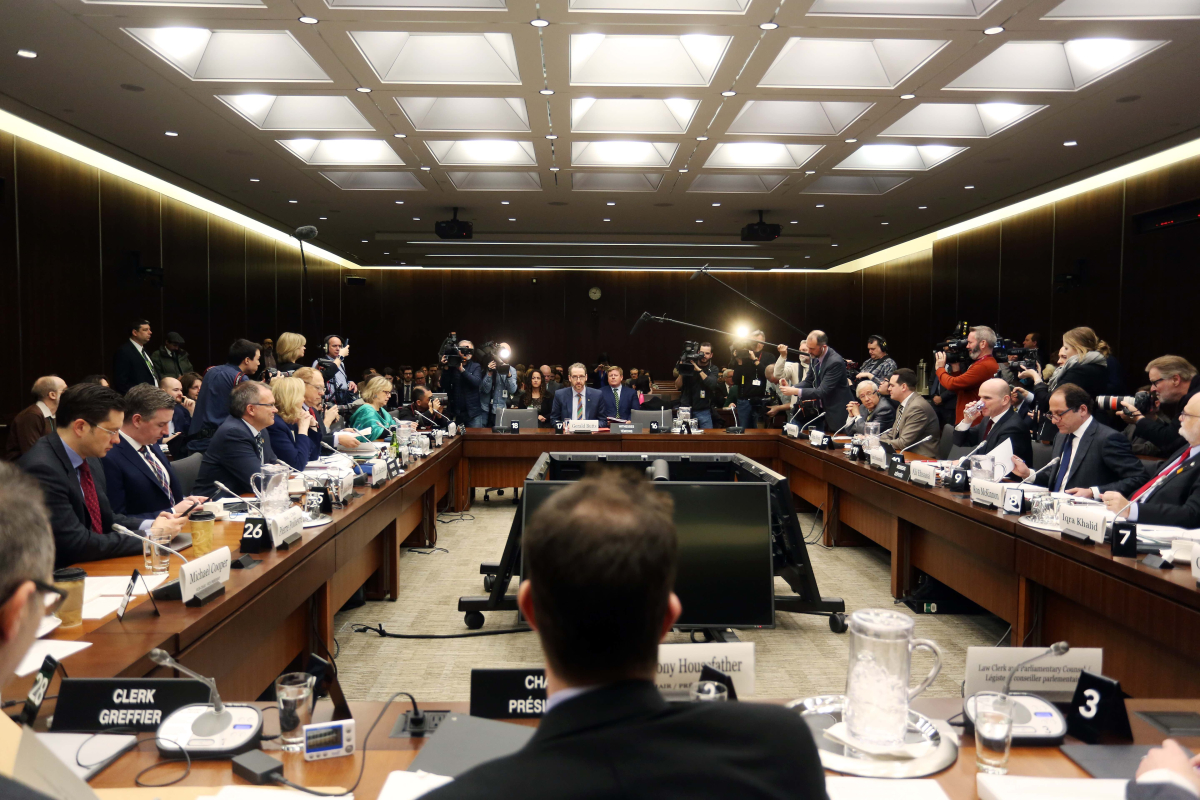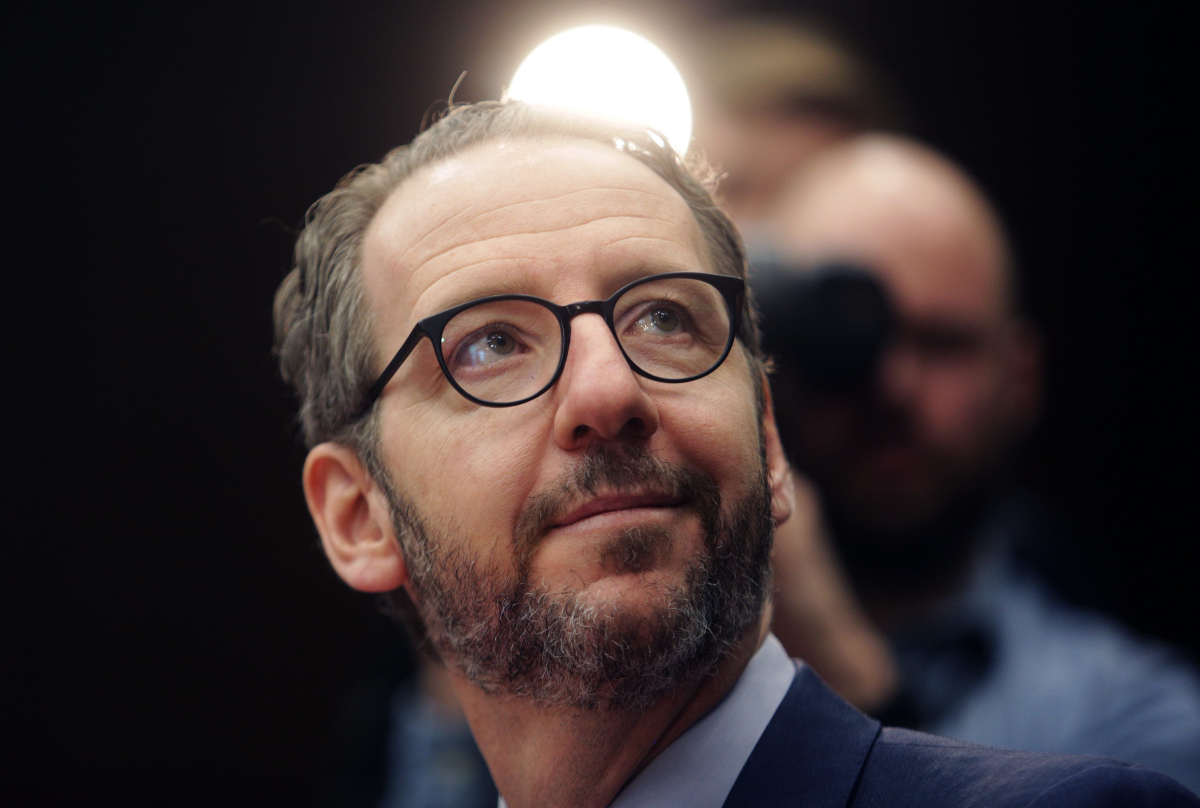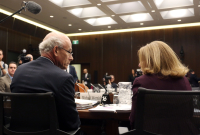On Dec. 5, 2018, Jody Wilson-Raybould met for dinner with Gerald Butts at a luxurious downtown Ottawa hotel. Roughly three months later, both are out of their former jobs, and the highly-disputed nature of that meeting sits at the centre of the largest political scandal the Trudeau government has faced.
Wilson-Raybould, the former justice minister and attorney general, said during her testimony to the House of Commons justice committee on Feb. 27 that by the time she met the former top aide to Prime Minister Justin Trudeau for that ill-fated dinner, she had already been "hounded" for months by Trudeau's officials.
Over dinner at the Château Laurier, she told him of the pressure she was under from Trudeau's office to order the director of public prosecutions to offer a deal to SNC-Lavalin that would help the Quebec engineering giant avoid a criminal trial on fraud and corruption charges. She told Butts "I had made up my mind and the engagements were inappropriate." But Butts "took over the conversation," she added, telling her she "needed to find a solution."
Appearing before the justice committee on Wednesday, Butts presented a very different version of events.
He said he left the dinner feeling it was "the best discussion we had had in a while" and only learned later that Wilson-Raybould had experienced it as pressure. "I did not, and do not, see how our brief discussion of that file constituted pressure of any kind," he insisted.
The former principal secretary in the Prime Minister's Office has been a friend of Trudeau for decades and an aide since his leadership campaign. He served until February, when he resigned over the growing scandal that has become a crisis, leading most recently to the resignation of another cabinet minister, Jane Philpott.
The former president of the Treasury Board Secretariat quit her post on March 4, saying she had "lost confidence" in how the government dealt with the matter. Public opinion polls have also shown that the matter is severely hampering the Liberals and favouring Conservative Leader Andrew Scheer, with a general election less than eight months away.
Trudeau and others in government have said that one of their primary concerns has been to protect jobs. SNC-Lavalin, which has its headquarters in Montreal, employs 9,000 people across the country in a variety of sectors, including infrastructure, oil and gas, and mining.
But it could lose a major source of revenue from government contracts since a company that receives a criminal conviction, could be banned from bidding on federal contracts for up to 10 years.
Butts' testimony occurred in the morning. During a second session in the afternoon, Canada's top civil servant, clerk of the privy council Michael Wernick returned to the committee to deny he acted in a partisan manner during his previous comments to the committee. He also presented new information on how he saw the "public interest consideration" in play with SNC-Lavalin after the company's share price tanked, "making it vulnerable to takeovers."
He said the law was meant to make sure Canada can't let companies off the hook because of competition with foreign countries. "My view is that the economic impacts of jobs—and it's explicitly in the criminal code, the impact on suppliers, pensioners, customers, communities—is a relevant public interest consideration."
Nathalie Drouin, deputy minister of Justice and deputy attorney general, also testified and inserted a new wrinkle to the story. She said the Privy Council Office had asked the Justice Department for a report on possible impacts on SNC-Lavalin if the prosecution resulted in a criminal conviction, but that Wilson-Raybould's office told them to sit on the report after it was drafted.
"My department developed the draft legal advice. It was not provided to PCO at the request of the minister's office," she said.

The hotel dinner: 'nothing remotely negative'
Butts said that Wilson-Raybould solicited the hotel meeting and raised the subject with him as part of an extended discussion about a number of unrelated topics.
"She asked if I had a view on the (SNC-Lavalin) file, and I said I understood our offices were working together on ideas," said Butts. They "talked briefly about the idea" of Wilson-Raybould getting an outside legal opinion from a retired Supreme Court chief justice on offering a deal to SNC-Lavalin.
"My suggestion was that it is a legitimate public policy discussion to have in this circumstance, and it would help clarify the attorney general’s powers in this and any subsequent case," he said.
"I suggested she speak with the clerk or the public service for more expert advice. I said that it was her call, and I knew it was her call. I have no memory of her asking me do anything, or to speak with staff about any aspect of the file...there was nothing remotely negative about the exchange from my perspective."
In fact, Butts said, "I walked away from dinner thinking it was the best discussion we had had in a while." They parted the meeting "as friends and colleagues," he added, later exchanging a couple of text messages.
"Nice to see you," wrote Butts.
"Nice to see you too. Thx for the convo. Please say alo to PM. Heard him speaking my language in his speech... Good luck in Montreal — we stick to our guns/plan we will be good," Wilson-Raybould replied.
The next day, Butts said they texted again about other topics they had dicussed. One was about the Canadian arms contract to sell light-armoured vehicles to Saudi Arabia, also in the news at that time. The other topic was regarding a directive on litigation matters involving Indigenous peoples. SNC-Lavalin was not mentioned in any of the exchanges, Butts added.
But the fate of the Quebec engineering and construction company did become an issue in the weeks that followed. Butts said he realized that "two people can experience the same event differently."
"I believed at the time that the minister shared my interpretation of our dinner, and I only quote these messages so you can appreciate why I was so surprised to hear a couple of months later that the minister experienced that dinner as pressure," he said. "I did not, and do not, see how our brief discussion of that file constituted pressure of any kind."
Butts then blamed himself for what would happen next, as Trudeau's relationship with Wilson-Raybould broke down. He said this occurred due to his advice to Trudeau on the January cabinet shuffle.
Even so, he maintained that no one did anything wrong in their discussions about SNC-Lavalin, just that he failed to properly manage the apparent disagreement between Wilson-Raybould and Trudeau on the issue.
"There was no malice directed toward anyone personally or professionally," Butts told the committee. "However a breakdown in the relationship between the former attorney-general and the prime minister occurred. That breakdown coloured the unrelated events of the fall of 2018 in a negative light for many of the people involved. As the main point of contact in the PMO for the former minister of justice, I take responsibility for it."

Wernick orchestrated brief on Trans Mountain
During his testimony, Wernick said that the cabinet shuffle was finalized on Jan. 10, and the next day he called Drouin and asked her to make sure David Lametti, the new justice minister, "would be brought up to speed on a number of prominent files that he would likely face questions about in the near future."
"I mentioned the carbon pricing litigation, the (Vice-Admiral Mark) Norman trial, TMX (the Trans Mountain pipeline expansion project) and SNC-Lavalin," he said. "I never singled out SNC as the only issue and it is a misreading of my conversation with the deputy attorney general to suggest it was."
Butts said no one in the prime minister's office knew that Wilson-Raybould had made up her mind in September, and that the prime minister's office was consulting the attorney general after recognizing that it had not adequately consulted with First Nations, related to the Trans Mountain pipeline expansion project.
"Fresh in our minds was a recent Federal Court of Appeal decision that had found that the government had not conducted consultations sufficiently in connection with the TMX pipeline," he said.
But by January, things took a turn for the worse when Trudeau decided to shuffle his cabinet due to the departure of Scott Brison, who was president of the Treasury Board Secretariat.

He explained that Trudeau had decided that Jane Philpott was the best candidate to take on this job. So he moved Philpott from her position as Indigenous services minister to the treasury board, and wanted to move Wilson-Raybould to the Indigenous services portfolio to send a message that this was a priority for the government.
None of them had anticipated that Wilson-Raybould would turn down this role. She said she had spent her life opposed to the Indian Act and could not see herself in charge of programs administered under its authority.
Butts said he later gave advice to Trudeau that she should be moved, because otherwise, he might have difficulty managing cabinet by allowing her to remain in a position after he had asked her to leave.
"Cabinet invitations are not the product of shared decision-making," Butts said. "It is the prime minister's decision to make and his alone to make. My advice was that the prime minister should not set the precedent that a cabinet minister could refuse a new position, and effectively remain in one position for the life of the government."

But over the next few days, Butts said he realized through subsequent conversations with Wilson-Raybould that "trust had broken down" between the PMO and the minister.
"I was deeply concerned by what the minister was saying," he added. "It was all a great and sad surprise to me that she could draw those sorts of conclusions about her colleagues, including myself. I tried to counter her misapprehensions with repeated, honest efforts. In the end, I was unable to do so. and here we are today."
Butts also said that no one in the prime minister's office had previously raised concerns about whether the Wilson-Raybould would be shuffled over the SNC--Lavalin file until Trudeau spoke with Philpott on Jan. 6 to offer her the job at the treasury board.
"The prime minister assured minister Philpott that the shuffle had nothing to do with the file, and asked her if she would help with the transition of her ministry to minister Wilson-Raybould," Butts said. "She said that she would, but she was clearly worried how Minister Wilson-Raybould would react to the news."
Butts said he then spoke to Trudeau privately about the matter. "He was clearly disturbed and surprised by what minister Philpott had said," Butts explained.
"I said to him that he had to factor into his thinking the possibility that the assertion she made would be made publicly, however far-fetched it seemed. I advised him that he has to know in his heart that is not the reason he was moving minister Wilson-Raybould. He replied that he knew that was not why he was moving her, and he would not change his mind."
Opposition laughs at top civil servant's testimony
After Butts left the committee, opposition members demanded to know why the two testimonies differed so broadly.
"Regardless of whether you believe (Wilson-Raybould), or not believe her, there are stark contradictions, and one of them isn't telling the full story. We need to find out which one it is," said Conservative MP Lisa Raitt, in comments to reporters outside the committee room.
“The fact that he can come to this committee and say there was nothing inappropriate at all — that he didn't know that Ms. Wilson-Raybould had taken a position — that is just ludicrous to suggest that," said NDP leader Jagmeet Singh.
Both Raitt and Singh also slammed Liberal MPs for voting down a motion at the committee to recall Wilson-Raybould in response to the testimony from Butts.
"I think Canadians are going to be quite ticked off, to be honest," Raitt said. "I think that's atrocious. I think Canadians want to hear the entire story, especially given that Mr. Butts entire testimony was completely oppositie of what Jody Wilson-Raybould said, especially on when dealing with his staff at the Prime Minister's Office."
Wilson-Raybould issued a statement after the committee saying she would "of course make myself available to the committee if requested to give additional testimony, to answer any further questions and to provide further clarity that may be required," according to the Globe and Mail.
“I will note, as I indicated at the time, my statement to the committee was not a complete account but only a detailed summary.” She added that her statement only addressed her time as attorney general.
The committee passed a motion Wednesday saying it would consider calling additional witnesses when it meets again on March 19, the day of the federal budget.
Green Party Leader Elizabeth May questioned whether Butts was aware of any evidence confirming SNC-Lavalin's claims of a threat to jobs.
"Based on the 2018 audited financial statements of SNC-Lavalin, They currently have $15 billion in back orders. They have a very secure financial situation with gross revenues of $10 billion. Is there any evidence that jobs were actually at stake by letting this go through the courts and letting the independent director of public prosecutions do her job and the attorney general, also, do her job?"
He wasn't able to provide any specific evidence.
"That's my understanding from the department of finance briefings, but I have to say, it's been a long time and I can't recall anything specific," Butts told the committee. "To be clear, I can't recall, I cannot cite a specific study being done on a specific day by a specific person. I was briefed multiple times on that."
While Butts took time to thank the committee profusely and offered several other polite comments where he mentioned geographic or working relationships with committee members, Wernick did not offer such a friendly disposition, instead appearing to bristle at some of the questions.
Opposition members were similarly icey in return. At one point, Wernick referred to Wilson-Raybould's previous testimony noting that she agreed nothing illegal had occured. Opposition members exploded in laughter at that comment, wondering why the bar would be so low.
Perhaps in reference to Wilson-Raybould's prior reference to the Nixon-era Saturday Night Massacre, Tory MP Pierre Poilievre, with a giant grin on his face, shouted "I am not a crook!"
Editor's note: This story was updated several times throughout March 6, 2019, most recently at 7:20 p.m. Eastern to include additional information and quotes from the committee meeting. It was updated again at 7:59 p.m. ET with additional comments from Butts and Elizabeth May about jobs.







Comments
Now we've heard Butt's truth. Next?
What I find so startling about Mr. Butts testimony is the Liberal government's whole argument is about the innocent people that would lose their jobs and the pension funds that would be hurt if SNC - Lavalin was found criminally responsible for their actions. Yet when Ms. Elizabeth May asked how many jobs would be lost and pension funds jeopardized, Mr. Butts could not cite any research by the government to validate such job losses or pension funds being jeopardized. Complete political spin that all the Liberal cabinet and caucus members lined up like parrots to repeat. It is not a wonder Ms. Jane Philpott would not sacrifice her integrity to spouse unfounded information. This is such an insult to Canadians intelligence and why many talented people won't run for office because they are asked to misrepresent information to their constituents and Canadians. Why such lack of transparency? This is a self made mess that is costing Canadians millions of dollars to address. Both the government and main opposition party are stuck in the 20th Century with their policies and strategies which are becoming obsolete. We are in the 21st Century. Leadership, truth and integrity please.
I wonder if Mr. Trudeau regrets appointing Mr. Wernick to his new post just over three years ago? What was the process that was followed? Were other candidates also considered?